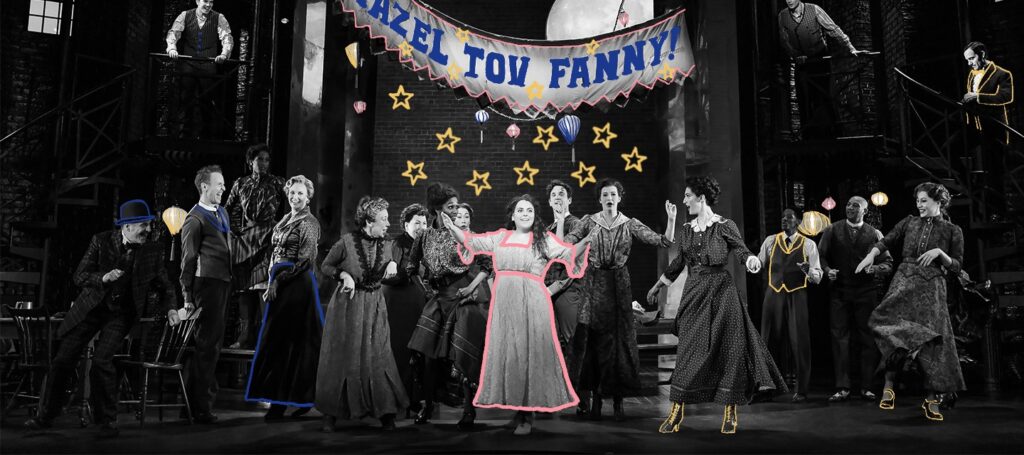


This ‘Funny Girl’ Has Laughs but No Lushness
Before we get to my thoughts on the Beanie Feldstein-led revival of Funny Girl, there are some things I have to confess. I used to love Glee. I loved Lea Michele on Glee. I loved Lea Michele as Rachel Berry as Fanny Brice in a (fictional but prescient) Broadway revival of Funny Girl on Glee. As if all this wasn’t embarrassing enough, I’ll even admit that I only learned about Funny Girl because of Glee, which made me fall in love with “Don’t Rain on My Parade.” Though I’ve listened to Michele’s version many times, I am also obsessed with Naya Rivera and Lillias White’s less traditional takes on the song. All this to say, as someone with a lot of thoughts on this role, and as a fan of Beanie Feldstein’s, I entered this revival very interested to see what she would do.
For those who don’t know, Funny Girl tells the story of comedienne Fanny Brice’s rise to fame as a star in Ziegfeld’s Follies and her turbulent romance with gambler Nick Arnstein. Presumably, every audience member who sees this revival of Funny Girl will be comparing Feldstein to the legendary originator of the role, Barbra Streisand (it’s impossible not to). A tall order, indeed. Funny Girl has never been revived on Broadway before, and it’s easy to understand why: who would dare attempt to live up to Barbra? Feldstein tries, and comes nowhere close to succeeding, but reveals something deeper: take Barbra away, and Funny Girl is not a good musical.
The book by Isobel Lennart has structural issues, all the good songs (“People,” “Don’t Rain On My Parade,” etc.) and comedy (“Hello, gorgeous,” the pregnant wedding dress gag, the googly eyes for Arnstein) are in Act I, the second act is depressing, and the show has dated gender politics and a questionable message. How are we supposed to feel about a musical that traces a woman’s rise to fame alongside her disastrous marriage to a gambler who uses her money, goes to jail, and after he gets out, leaves her? The revised book by Harvey Fierstein barely improves on these things and adds material that brings the runtime to a whopping, and unnecessary, 2 hours and 50 minutes.
Feldstein does not have enough star quality to distract from all this. The big problem with her performance is, sadly, her voice: she vocally cannot handle the songs that made Funny Girl so famous. Her “Don’t Rain on My Parade” is strained. She mostly talks her way through “People.” When singing her big solos, she’s a bit timid, unsure, unconfident–all the things that Fanny Brice was not. It’s hard not to be disappointed and to not even feel a bit bad for her. Feldstein is giving it her all, but she just can’t live up to Barbra.
The very fact she is playing this role at all, as a curvy Jewish woman, is exciting in and of itself. This casting provides not just authenticity but brings out new aspects of the text. As a young girl, Fanny is told in “If A Girl Isn’t Pretty,” that to be successful in show business she must “be a standard size that fits a standard dress,” a lyric that here feels more meaningful than ever, especially when she does find career success. Thus, later, when she tells Nick, “You make me feel…sort of…beautiful” and he replies “You are beautiful,” the musical becomes a story of loving yourself and your body.
I will also say this: unquestionably Beanie Feldstein is a very funny girl. She has a superb understanding of physical comedy, tapping into exactly what made Brice’s comedy so hilarious. I cannot recall a time when I laughed so much at a musical, and after all, while we crave a powerful belt and beautiful vocal interpretations, isn’t one of the main goals of this show to make us laugh? By that metric, Feldstein knocks it out of the park.
In addition to the laughs, the production has a few delightful moments. “His Love Makes Me Beautiful” is the highlight of the show; it’s comedic perfection and the one time I fully loved Feldstein’s performance. “You Are Woman, I Am Man,” a manifesto of sexism, here was playfully inverted using clever physical comedy bits and ended with Feldstein on top (literally). An impressive tap dance by Jared Grimes (as Eddie) brings down the house but was not even part of the actual show, just a scene transition to give time for a costume change.
This highlights several of the larger problems of the actual stage business. The show has two choreographers: Ayodele Casel did the tap numbers and Ellenore Scott did the rest, and this split was evident. While the tap choreography was impressive and difficult, the dancing across the board lacked polish. The worst choreographic moment, though, was having to watch Ramin Karmiloo (an otherwise very serviceable Nick Arnstein) struggle through some basic dance moves in “Temporary Arrangement.”
Sadly in line with the uneven choreography was the direction by Michael Mayer. He couldn’t figure out what tone to strike: he treated the first act as one long comedy routine, but then the second act dragged on and was a downer. He faced blocking issues with David Zinn’s set, which was bizarrely constructed so as to make only about one-third of the stage actually playable. Mayer also couldn’t get the best out of his lead actors. Feldstein is much better at playing young Fanny but she struggles in the more mature, emotionally demading scenes, where her acting often gets heavy-handed; Karimloo comes across as slimy and unlikeable; and Jane Lynch as Mrs. Brice simply reprises Sophie from Queens, her character from The Marvelous Mrs. Maisel.
Funny Girl has a lot of laughs and sparkle (the follies costumes by Susan Hilferty are gorgeous) but is wanting in terms of substance. This is represented even in its curtain, which instead of sumptuous velvet is just a painted scrim–a fitting symbol for the production overall, which lacked the lushness I craved. In the end, the not-so-great distracts from the enjoyable, and quite funny, moments. To paraphrase Fanny, this production might be all wrong, but at least it’s good for a laugh, right?
Keep Reading

The “Hangmen” Martin McDonagh Wrote Lack Accountability, but Should the Play Get Away with the Same?
Hangmen, by Martin McDonagh and directed by Matthew Dunster begins on the day the Murder (Abolition of Death Penalty) Act was passed in England in 1965. Harry (David Threlfall), a former hangman who runs a pub in Northern England, is suddenly sought after by the press who want to know his thoughts on the historic […]
Read More
‘for colored girls’ Is a Timeless Movement in Compassion
After playwright Ntozake Shange’s death in 2018, her sister—the playwright Ifa Bayeza—said, “I don’t think there’s a day on the planet when there’s not a young woman who discovers herself through the words of my sister.” As I watched the revival of Shange’s “choreopoem” for colored girls who have considered suicide / when the rainbow […]
Read More












